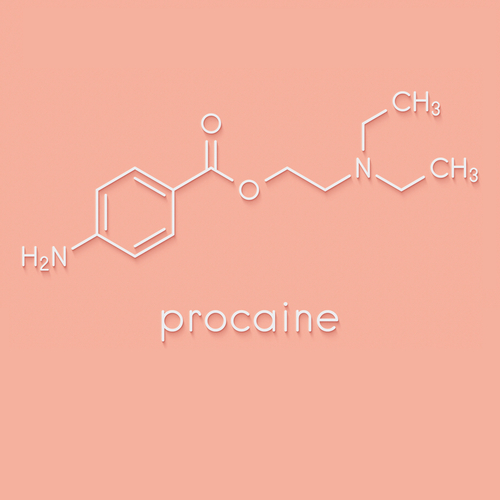
Background
Procaine is most often used as an anti-aging agent for conditions such as dementia, age-related decline in memory and thinking skills, quality of life, and many others, but there is no good scientific evidence to support these uses.
As a prescription-only injection, procaine is used for local anesthesia.
Safety Safety definitions
When given as a shot: Procaine is safe when the prescription-only product is given as a shot by a healthcare professional as a local anesthetic.
Special Precautions & Warnings:
Pregnancy and breast-feeding: It's LIKELY UNSAFE to use procaine for self-medication if you are pregnant. If you are breast-feeding, it is also best to avoid using procaine. Not enough is known about how it might affect the nursing infant.Myasthenia gravis, a progressive disease that weakens the muscles: If you have myasthenia gravis, you should not be given procaine intravenously (by IV).
Pseudocholinesterase deficiency, an inherited disorder: People with this disorder are sensitive to certain anesthetic drugs. If you have this disorder, you should not be given procaine by injection.
Systemic lupus erythematosus (SLE): Procaine might make this condition worse. Don't use procaine if you have SLE.
Effectiveness
- Pain reduction during surgery. Procaine injection is an FDA-approved prescription product used as a local anesthetic.
- Decline in memory and thinking skills that occurs normally with age. Early research shows that taking procaine by mouth or as a shot doesn't improve most measures of memory and thinking skills in older people. Also, it might cause side effects.
- Diseases, such as Alzheimer disease, that interfere with thinking (dementia). Early research shows that procaine doesn't improve thinking skills in people with dementia.
- Arthritis.
- "Hardening of the arteries" in the brain (cerebral atherosclerosis).
- Depression.
- Hair loss.
- High blood pressure.
- Sexual problems.
- Other conditions.
Dosing & administration
BY INJECTION:
- For local anesthesia. The prescription-only product is given as a shot by a healthcare professional.
Interactions with pharmaceuticals
Aminosalicylic acid
Interaction Rating=Moderate Be cautious with this combination.
The body breaks down procaine to get rid of it. Procaine is broken down to a chemical called aminobenzoic acid. Aminobenzoic acid might decrease the effectiveness of aminosalicylic acid. Taking procaine along with aminosalicylic acid might decrease the effectiveness of aminosalicylic acid.
Antibiotics (Sulfonamide antibiotics)
Interaction Rating=Moderate Be cautious with this combination.
The body changes procaine to para-aminobenzoic acid (PABA). PABA can decrease the effectiveness of certain antibiotics called sulfonamides.
Some of these antibiotics include sulfamethoxazole (Gantanol), sulfasalazine (Azulfidine), sulfisoxazole (Gantrisin), and trimethoprim/sulfamethoxazole (Bactrim, Septra).
Digoxin (Lanoxin)
Interaction Rating=Major Do not take this combination.
Digoxin (Lanoxin) helps the heart beat more strongly. Digoxin (Lanoxin) can also control how fast the heart beats. Getting a procaine injection can slow the heartbeat. Taking digoxin with procaine might cause your heartbeat to be too slow.
Muscle relaxants
Interaction Rating=Major Do not take this combination.
Procaine is given as a shot to numb pain. Taking procaine with some muscle relaxants can cause the numbing to last too long. Before getting a procaine injection tell your doctor if you are taking any muscle relaxants.
Some of these muscle relaxants include atracurium (Tracrium), pancuronium (Pavulon), succinylcholine (Anectine), and others.
Succinylcholine
Interaction Rating=Major Do not take this combination.
Procaine is injected and used to numb pain. Taking procaine with succinylcholine can cause the numbing to last too long.




